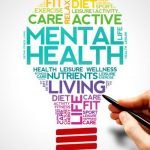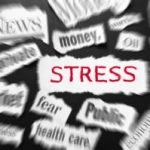Category: Stress

Times are uncertain. The world feels scary. Our normal day to day life has been turned upside down. Let me just start by saying this, if you are feeling anxious, scared, overwhelmed, frustrated… you are allowed to feel these emotions, it makes total sense why you feel this way, you are not alone, and you are not weak. Remember, pain in life is unavoidable, but suffering is a choice. Meaning, we are going to experience stress in our life, every person on this planet will, but it is ultimately how we respond to that stress that influences exactly how much pain we will experience. Let’s walk through some ways we can live with anxiety during times of stress.
Mindfulness of Emotions. When it comes to managing our anxiety during times of stress, an important first step that we tend to overlook is mindfulness. In order to reduce anxiety, we must first acknowledge that it is there. Allow yourself to pause and put a name on what you are feeling, notice if you feel it physically in your body, observe what thoughts are running through your mind. Try using the stem “I am aware of the emotion of ______, I am aware of the thought that _______.” By bringing mindful awareness to our anxiety in this way, we are bravely choosing to face our discomfort while also seeing it as something that we are experiencing in that given moment, not who we are or the way things will always be.
Self-Compassion. Now that you are observing your anxious mind in action, practice some self-compassion by normalizing the experience, validating its’ presence, being “kind to your mind.” We tend to create more suffering for ourselves when we judge ourselves for our emotions, when we tell ourselves we should not be feeling that way, or try to just “suck it up.” You are an amazing human doing the best you can with some really hard human things right now!
Changing Emotional Response. While part of our goal is accepting the anxiety through mindfulness and self-compassion, we also have the ability to create change in our emotional state and our response to it. First, we need to “check the facts” and get a good look at what our mind is telling us. Our minds tend to be great storytellers, mind readers, and fortune tellers. While these seem like super powers, these are actually mind tricks and traps that create more suffering. Checking the facts is seeing if your emotion and its’ intensity actually match reality (i.e., are valid), or if you are responding to a mind trick.
Next, ask yourself if the action urge associated with the emotion you are feeling is effective? For example, is being angry with your partner because they did not clean the house then throwing a shoe at them actually helpful here?? If the emotion is invalid and/or ineffective, we want to act opposite to what the emotion is telling us to do. So instead of avoiding work responsibilities because we are stressed, make a specific schedule to complete tasks. Instead of spending hours reading the news because we are scared, watch one news program then spend the rest of the day playing with the kids or watching movies.
Acceptance. Consider what is and what is not in your control. If there is a stressor that is in your control, practice problem solving. For stressors we cannot control, accept that we cannot change that reality and focus instead on what in the here and now is in your power. Remember, rejecting reality does not change reality. Instead of dwelling on how terrible it is to be stuck at home, make plans for a game night, clean out that room you have been avoiding, soak up the springtime outdoors.
Practice Gratitude. Lastly, practice gratitude every day. Spend some time thinking about what you have that you are grateful for rather than hyper-focusing on what you don’t have or what has been taken away, which tends to just create more stress. Be specific, instead of just saying you are grateful for your family, say “I am grateful that today my kids helped clean the kitchen and cuddled with me on the couch.”
We as humans are under an incredible amount of stress right now, but remember, as humans we are also incredibly strong and resilient. Importantly, please know you do not have to struggle with this alone. Sometimes the strongest thing we can do is ask for help. If your anxiety is persistent and intense and/or is significantly interfering with your life, please reach out to a mental health therapist. Telehealth services are being offered across the region, including at the Lindner Center of HOPE, who has a whole team of providers eager to help guide you through this.
 By Allison Mecca, PsyD
By Allison Mecca, PsyD
Lindner Center of HOPE, Staff Psychologist, Harold C. Schott Foundation Eating Disorders Program











